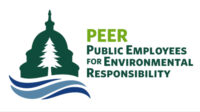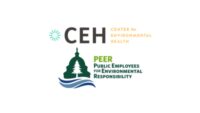Environmental groups call for agencies to make PFAS-free purchases
With over $650 billion in spending for goods and services, the federal government can 'spur innovation' by mandating its purchases be PFAS-free.

General Services Administration D.C. headquarters image courtesy of GSA
In a letter address to General Services Administration head Robin Carnahan, 25 environmental groups urged the GSA to immediately require PFAS-free products. A signatory, Environmental Working Group, issued a statement:
“Safer alternatives to PFAS are already widely available for many commonly purchased products, and 3M’s exit from PFAS manufacturing will help spur development of even more alternatives,” says John Reeder, vice president of federal affairs at EWG, in a statement. “There’s no reason the government should keep buying PFAS-containing products.”
The federal government purchases over $650 billion every year in goods and services, so a commitment to buy only products free of PFAS represents an enormous opportunity to stimulate the marketplace to supply safer alternatives to PFAS-containing products.
Here's the letter EWG signed along with other leading national environmental groups:
The undersigned twenty-five organizations and businesses urge the General Services Administration (GSA) to actively lead the federal government in curbing procurement of products containing per- and polyfluorinated alkyl substances (PFAS), as envisioned by President Biden’s Executive Order 14057. The Department of Defense (DOD) and several states, such as Michigan, New York, Minnesota, Connecticut, and others are already demonstrating the feasibility of restricting purchases of PFAS containing products. The purchasing power of the federal government presents an enormous opportunity to lead, and to build on these efforts and stimulate marketplace demand for safer alternatives. GSA’s leadership at the federal level is essential for accelerating progress toward ending non-essential purchases of PFAS-containing products.
The executive order and related directives require federal agencies to “prioritize the procurement of substitutes” for PFAS containing products. The private sector is ready to respond. Already manufacturing companies offer hundreds of PFAS-free options for commonly purchased products, such as carpets, furniture, food ware and food packaging, flooring, and floor finishes. These companies have earned recognition for PFAS-free products from credible, independent certification organizations. DOD and states are demonstrating progress, but broad-based, rapid progress toward eliminating non-essential PFAS purchases and accomplishing the goals of the President’s executive order will require strong leadership from GSA.
The undersigned organizations urge you to make implementation of the administration’s new policy a top priority for the General Services Administration (GSA), and we urge you to accept the following recommendations:
- Phase out Multiple Award System (MAS) contracts for products that contain intentionally added PFAS. GSA should build upon DOD’s approach and immediately stipulate that suppliers must provide to the government only products that are free of intentionally added PFAS. This is a practical and effective approach for many product categories for which competitively priced, safer alternatives to PFAS-containing products are readily available. With this change, government procurement officials can easily comply with the executive order simply by purchasing from the MAS. To avoid supply disruptions, preserve competition, and stimulate markets for safer alternatives, GSA should proactively announce its plan and schedule for implementing the new MAS contract requirements.
- Incorporate sustainability into Federal Acquisition Regulations (FAR), tools and training. Federal procurement using the MAS accounts for only a portion of federal purchasing. To more broadly incorporate sustainability across federal purchasing, revisions to the FAR are needed. As an initial step, we recommend GSA work with DOD and the National Aeronautics and Space Administration, as well as the Environmental Protection Agency, to set an ambitious goal for completing the promulgation of FAR amendments to require all agencies to incorporate into procurement contracts new provisions that prohibit suppliers from providing PFAS-containing products to the government, similar to the government-wide MAS contracts described above.
- Expand tracking and improve reporting on government-wide progress in sustainable procurement. The GSA-operated System for Award Management (SAM) should be expanded to fully capture the sustainable product purchasing requirements of the President’s new directive, including products identified by recognized certifications that treat PFAS as a class and prohibit their use in every level of certification. In addition, annual summary data for individual agencies by product category should be published in a user-friendly and searchable format to facilitate year-by-year comparison of each agency’s progress toward meeting fully sustainable procurement performance goals.
In addition to these specific recommendations, we urge GSA to make sustainable procurement a top tier agency goal. While sustainable acquisition is a “strategic initiative” in GSA’s strategic plan, it isn’t recognized as a “fundamental strategy” or “key performance goal.” Nor has GSA included sustainable procurement as one of its 12 performance indicators in the agency’s most recent Annual Performance Report. It is time for GSA to lead, and to publicly commit to making sustainability a priority mission focus.
GSA has the authority and capacity to greatly reduce federal procurement of PFAS-containing products, and to advance the goals of President Biden’s executive order on sustainability. We urge GSA to accept our recommendations for decisive action.
We respectfully request an opportunity to meet with you or a representative at your earliest convenience to discuss GSA’s implementation of the President’s directive and opportunities to move the government toward PFAS-free procurement.
Sincerely,
American Sustainable Business Network
Breast Cancer Prevention Partners
Center for Environmental Health
Clean Production Action
Clean Water Action
Ecology Center
ECOS
Environmental Defense Fund
Environmental Justice Ministry, Cedar Lane Unitarian Universalist Church
Environmental Working Group
Fight for Zero, Inc
Green Science Policy Institute
League of Conservation Voter
Locust Point Community Garden
Maryland Legislative Coalition
Merrimack Citizens for Clean Water
National Family Farm Coalition
National PFAS Contamination Coalition
New York Sustainable Business Council
North Carolina Conservation Network
PIRG
Rural Coalition
Safer States
Seventh Generation
Toxic-Free Future
Zero Waste Washington



.jpg?height=200&t=1664821385&width=200)